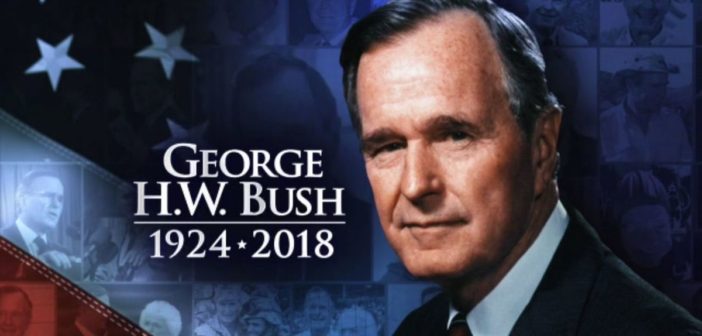The 41st President of the United States, George H.W. Bush, died Nov. 30, 2018, at his home in Houston, Texas.
The 94-year old WWII veteran’s health had been in decline for the past few months. The day after his late wife Barbara Bush passed away, Mr. Bush was hospitalized in Maine due to an infection in his bloodstream. Before this incident, Bush had suffered from Graves’ disease and vascular parkinsonism, which left him wheelchair-bounded since 2012.
His son, George W. Bush said while reading his father’s eulogy, “Dad taught us that public service is noble and necessary, that one can serve with integrity and hold to the important values like faith and family.”
To describe his service to the country as extraordinary would barely scratch the surface of his remarkable involvement. When Bush was 18-years-old, he enlisted in the Navy, where he would go on to fly 58 combat missions, as the youngest fighter pilot in World War II. After returning from war, he became interested in politics and was elected to the house of representatives in 1966 for two terms.
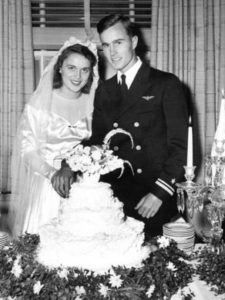
Barbara and George Bush first met when she was 16; they got married in 1945 in Rye, New York. Photo Credit: @TheBushCenter
In 1971, Bush served as the 10th United States Ambassador to the United Nations for roughly two years. Shortly after, he would fill the position of Chairman of the Republican National Committee and would even become the Chief of the U.S. Liaison Office to the People’s Republic of China. In 1976, George H.W. Bush became the 11th Director of the Central Intelligence Agency, where he served his role for 357 days. On Jan. 20, 1981, Bush would become Vice President to the 40th President Ronald Reagan until Jan. 20, 1989, the day he became President of the United States. In addition to his excellent qualifications which made him well-suited as a leader, Bush’s rise to the presidency was impressive as he was the first sitting Vice President to be elected as a President since Martin van Buren in 1836.
“Dad was always busy – a man in constant motion but never too busy to share his love of life with those around him,” George W. Bush said of his father.
Bush’s wife, Barbara, passed away eight months prior to his death, on April 17, 2018. The couple married in January 1945, and the two shared 73 years together. They are survived by their six children, 14 grandchildren and seven great-grandchildren, who cherished and adored them.
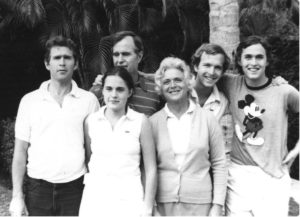
The Bush family is often considered to be a political dynasty, starting with George H.W. Bush’s father, Prescott Bush. (From Left to Right Back: George Bush Jr., George Bush Sr., Neil Bush and Marvin Bush; Front: Dorothy Bush and Barbara Bush) Photo Credit: @Bush41
Unbeknown to many, the Bush family had a daughter, their first child, Robin, who passed away from leukemia in 1953 at the age of 3. In an interview with CNN’s Larry King to promote his book “George H.W. Bush: My Extraordinary Life,” Bush stated that although it was difficult to recover from the loss of his daughter, her death brought the Bush family closer together.
In the eulogy, George W. Bush also said, “He strongly believed that it was important to give back to the community and country in which one lived. He recognized that serving others enriched the giver’s soul.”
At the end of his presidency, George H.W. Bush aided his successor, former president Bill Clinton, in raising funds for Hurricane Katrina victims and southeast Asia tsunami victims. His charity work also consisted of the Bush-Clinton Coastal Recovery Fund, where both former presidents gave monetary contributions to help communities close to the Gulf Coast.

Although George H.W. Bush lost the 1992 presidential election to Bill Clinton, both men have formed an incredibly close friendship over the years. Photo Credit: @thehill
Covenant House, a privately-funded agency which provides shelter and other services to America’s homeless, has also been supported by George Bush Sr. His philanthropy does not stop at disaster recovery projects as he has also had a long history with the University of Texas MD Anderson Cancer Center, which is in partial influence by his daughter’s death.
Bush’s character as an honorable man was emphasized by his son who proudly said that his father knew how to be a true and loyal friend. Even beyond the grave, Bush continues to exemplify the morals he stood by while alive since he invited the controversial, current-sitting president Donald Trump to his funeral.
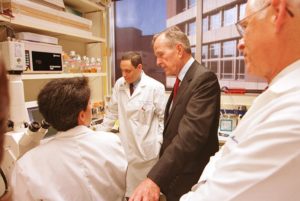
Over the decades, since their daughter’s death from leukemia, both Barbara and George Bush have been ambassadors to the University of Texas MD Anderson Cancer Center. Photo Credit: www.mdanderson.org
The invitation starkly contrasts the late Senator John McCain’s wishes, since he did not wish to have Donald Trump at his funeral and opted to have the presence of his Vice President Mike Pence instead.
In Bush Sr.’s 1990 interview with Larry King, he said, “I just don’t think it’s seemly for a former president to always be carving away at the president.”
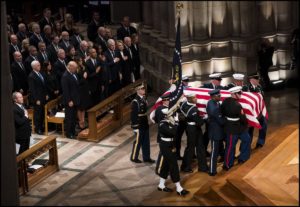
The casket of George H.W. Bush arrived at the National Cathedral in Washington, where it was laid before the mourners. Seated in the front row were President Donald Trump (2017 – Present), former president Barack Obama (2009-2017), former president Bill Clinton (1993-2001) and former president Jimmy Carter (1977-1981), all of whom were with the respective First Ladies. It was a rare occasion to see all former presidents together in harsh and uncivil times. Photo Credit: @dougmillsnyt
His invitation signifies how much he values unity and generosity in the country he has spent decades serving. To the very end, George H.W. Bush upheld the words of his 1989 inaugural address, “I take as my guide the hope of a saint: in crucial things, unity; in important things, diversity; in all things, generosity.”

